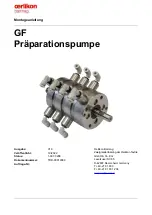
Operating Instructions, Form No. 102842, Back sheet 2 of 4
OPERATION
The P460 can be operated only in the horizontal position. All other hand pumps can be operated in a horizontal
position or in a vertical position with head pointing downward.
Refer to Table 1 and your pump name plate to determine your style of pump.
IMPORTANT: Figure 1 illustrates
the
normal drop of handle effort
experienced when all
(except P59)
two-stage pumps shift from
low pressure stage to
high pressure stage.
Two-way Valve
Pumps with a two-way valve are for use with single-
acting cylinders.
1. To extend the cylinder, turn the valve knob counterclockwise to a closed (seated) position.
Note: Hand tight
only!
Work the pump handle up and down to build pressure.
2. To release pressure, open the valve slowly by turning the knob clockwise to control the load.
Four-way Valve
Pumps with a three-position, four-way valve are for use with double-acting cylinders. The hose connection for
extending a cylinder can be made to either port. With the handle in the forward position, the fluid is directed to the top
fluid port. To maintain (hold) pressure, stop the pumping action. When the valve handle is in the center position, fluid
flow is blocked to both ports.
WARNING: The operator should always release the pressure slowly.
PREVENTIVE MAINTENANCE
IMPORTANT: Any repair or servicing that requires dismantling the pump must be performed in a dirt-free
environment by a qualified technician.
Lubrication
Apply lubricant regularly to all pivot and rubbing points.
Use a good grade of No. 10 motor oil or grease. Do not use dry lubricants.
Bleeding Air From the System
Air can accumulate in the hydraulic system during the initial set-up or after prolonged use, causing the cylinder to
respond slowly or in an unstable manner. To remove the air:
1.
Position the cylinder at a lower level than the pump, and turn the cylinder rod end down.
2.
Extend and retract the cylinder several times without putting a load on the system. Air will be released into the
pump reservoir. Follow the fluid level instructions for your reservoir type to release the air from the reservoir and
top off the fluid supply.
Bleeding Air From The Pump
When the pump is first put into use, or after refilling the pump's reservoir it may be necessary to bleed any trapped air
from the pump. If this is not done the pump will not function properly (will not build pressure or has very spongy
operation).
To bleed air from the pump, turn the pressure control knob counterclockwise (CCW) (turn lever down or clockwise on
P460 models) and operate the pump handle up and down approximately twenty times. Turn the pressure control knob
clockwise (CW) to its full stop position (turn lever up or CCW on P460 models). The pump should now be bled of air
and ready to use.
Ha
nd
le
Ef
fo
rt
Unloading
Pressure
L
o
w
P
re
ss
u
re
S
ta
g
e
Hig
h P
res
sur
e S
tag
e
Figure 1
Pressure

























